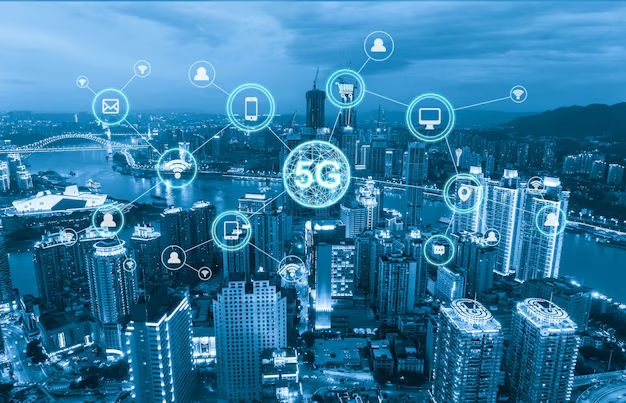As businesses continue to embrace digital transformation, the demand for high-speed, secure, and low-latency wireless connectivity has never been greater. Traditional networking solutions, including Wi-Fi and public 5G, often struggle to meet the performance, security, and reliability needs of enterprise applications. This is where private 5G networks come into play.
A private 5G network is a dedicated, standalone cellular network designed exclusively for an organization’s use. Unlike public 5G, which serves millions of users over shared infrastructure, private 5G provides enterprises with complete control over their network, ensuring higher performance, stronger security, and tailored connectivity solutions. By leveraging private 5G, businesses across industries, from manufacturing and logistics to healthcare and aerospace—can unlock unprecedented levels of automation, efficiency, and real-time data processing.
With the ability to support massive IoT deployments, enable mission-critical communications, and provide seamless integration with edge computing, private 5G networks are redefining enterprise connectivity. This blog explores the architecture, benefits, challenges, and future of private 5G, highlighting its transformative impact on modern businesses.

Understanding Private 5G Networks
What is a Private 5G Network?
A private 5G network is a dedicated cellular network that provides wireless connectivity exclusively for a specific organization, such as a factory, hospital, or university campus. Unlike public 5G networks operated by telecom providers, a private 5G network is built, managed, and controlled by the enterprise itself, allowing for customized security, performance, and operational flexibility.
These networks can operate using licensed, unlicensed, or shared spectrum, depending on regional regulations. Companies can deploy standalone private 5G networks (with their own core network and infrastructure) or hybrid models, which integrate with public 5G for additional coverage.
Key Components of a Private 5G Network
A private 5G network consists of several core elements that ensure seamless connectivity and efficient data transmission:
- Radio Access Network (RAN): The network infrastructure, including antennas and base stations, that provides wireless connectivity.
- Core Network: Manages network traffic, authentication, and device connections, enabling key features like slicing and low-latency communication.
- Edge Computing: Processes data closer to the source, reducing latency and improving real-time decision-making.
- Spectrum Allocation: Private 5G networks can use licensed, unlicensed, or shared spectrum, depending on regulatory policies.
- Network Management & Security: Enterprises have full control over network configurations, security policies, and access management.
Comparison with Wi-Fi and LTE for Enterprise Use
While Wi-Fi and LTE have been widely used in enterprise environments, private 5G offers greater reliability, security, and scalability:
- Wi-Fi: Ideal for office environments but struggles with interference, congestion, and security vulnerabilities in large-scale industrial settings.
- LTE: Provides better coverage and reliability than Wi-Fi but lacks the ultra-low latency and high-speed capabilities of 5G.
- Private 5G: Combines the best of both technologies—high speed, low latency, secure connectivity, and better control over network operations.
By leveraging private 5G networks, enterprises can achieve next-generation wireless connectivity tailored to their operational needs, ensuring seamless integration with emerging technologies such as AI, IoT, and automation.
Key Benefits of Private 5G Networks for Enterprises
Private 5G networks offer enterprises a range of advantages, from ultra-fast connectivity to enhanced security and reliability. Unlike public 5G or Wi-Fi, private 5G is designed to meet the specific needs of businesses that require high performance, low latency, and complete network control. Below are the key benefits:
1. Ultra-Low Latency and High-Speed Connectivity
- Private 5G networks provide high-speed data transmission with significantly lower latency compared to Wi-Fi and LTE.
- This ensures real-time communication, making them ideal for industrial automation, robotics, AR/VR applications, and remote operations.
- Applications such as autonomous vehicles, remote surgeries, and real-time machine monitoring rely on ultra-low latency to function efficiently.
2. Enhanced Security and Data Privacy
- With a dedicated network infrastructure, enterprises have full control over data flow, encryption, and security policies.
- Unlike public 5G, which shares network resources with multiple users, private 5G reduces the risk of cyberattacks and data breaches.
- Organizations in healthcare, defense, and finance benefit from secure, on-premises communication that meets strict regulatory requirements.
3. Customization and Network Control
- Enterprises can tailor private 5G networks to meet their specific needs, such as network slicing, traffic prioritization, and custom configurations.
- This flexibility allows businesses to allocate network resources efficiently, ensuring that critical applications always receive priority bandwidth.
- Companies can also integrate edge computing to process data locally, enhancing speed and performance.
4. Improved Reliability and Reduced Congestion
- Unlike Wi-Fi, which suffers from interference, congestion, and signal degradation, private 5G delivers consistent and reliable connectivity.
- In industries like manufacturing, logistics, and smart cities, uninterrupted connectivity ensures seamless automation and real-time monitoring.
- Private 5G networks also support device density, allowing thousands of IoT devices to connect without performance issues.
5. Massive IoT Connectivity and Scalability
- Private 5G networks are designed to support large-scale IoT deployments, making them ideal for factories, warehouses, and energy grids.
- They provide high-speed, low-latency connectivity for thousands of sensors, machines, and smart devices, improving operational efficiency.
- As businesses grow, private 5G networks can be easily expanded to accommodate new locations, devices, and applications.
6. Cost Efficiency in the Long Run
- While the initial deployment cost of private 5G is high, it eliminates dependency on telecom providers, leading to lower long-term operational costs.
- Enterprises can reduce data transmission costs by keeping critical operations within their own infrastructure.
- Better resource utilization and network optimization help businesses achieve higher efficiency and lower downtime, improving overall ROI.
7. Support for Industry 4.0 and Emerging Technologies
- Private 5G seamlessly integrates with AI, machine learning, edge computing, and cloud platforms, driving innovation in Industry 4.0.
- It enables advanced automation, predictive maintenance, and remote asset management, transforming industries such as manufacturing, healthcare, and logistics.
- Technologies like autonomous drones, robotics, and connected smart grids are optimized with private 5G, leading to smarter, data-driven decision-making.
Industries Leveraging Private 5G Networks
Private 5G networks are transforming multiple industries by enabling high-speed, low-latency, and highly secure wireless connectivity. From manufacturing to healthcare, enterprises are leveraging private 5G to enhance efficiency, automation, and real-time data processing. Below are some key industries adopting this technology:
1. Manufacturing and Industrial Automation
- Private 5G networks power smart factories, enabling real-time monitoring, predictive maintenance, and industrial IoT (IIoT) applications.
- Automated guided vehicles (AGVs) and robotic arms in manufacturing plants rely on ultra-low latency communication for seamless operations.
- Companies like Siemens, Bosch, and BMW are implementing private 5G to achieve fully automated and connected production lines.

2. Healthcare and Telemedicine
- Hospitals and healthcare facilities use private 5G for remote patient monitoring, robotic surgeries, and seamless telemedicine services.
- Private 5G enables real-time transmission of high-resolution medical images, improving diagnostics and treatment outcomes.
- Smart wearables connected via private 5G allow for continuous health tracking, benefiting patients with chronic conditions.

3. Logistics and Supply Chain Management
- Warehouses and distribution centers use private 5G for real-time asset tracking, automated inventory management, and smart logistics.
- Autonomous drones and self-driving forklifts operate efficiently within warehouses due to high-speed, low-latency connectivity.
- Companies like Amazon and DHL are integrating private 5G for next-generation logistics optimization.

4. Smart Cities and Public Infrastructure
- Private 5G is revolutionizing traffic management, public safety, and connected infrastructure in smart cities.
- Intelligent surveillance systems use private 5G for real-time video streaming and AI-powered analytics.
- Connected streetlights, smart grids, and urban mobility solutions improve energy efficiency and sustainability.

5. Automotive and Autonomous Vehicles
- Private 5G networks enable vehicle-to-everything (V2X) communication, supporting self-driving cars and intelligent transportation systems.
- Automakers leverage private 5G for connected car testing, software updates, and in-vehicle infotainment.
- Companies like Tesla, Ford, and Mercedes-Benz are using private 5G for advanced driver-assistance systems (ADAS) and smart manufacturing.

6. Energy and Utilities
- Private 5G networks help monitor and control critical infrastructure like power plants, wind farms, and oil refineries.
- Smart grids leverage private 5G for real-time load balancing, fault detection, and energy optimization.
- Remote monitoring of offshore oil rigs and mining operations improves safety and operational efficiency.

7. Defense and Aerospace
- Private 5G provides highly secure, low-latency communication for military bases, defense operations, and unmanned aerial vehicles (UAVs).
- Airports and aerospace industries use private 5G for real-time flight data analytics, baggage tracking, and aircraft maintenance.
- Satellite communication and space exploration benefit from private 5G’s high-speed data exchange capabilities.

8. Retail and Smart Shopping Experiences
- Private 5G enhances customer experiences in retail stores with smart checkouts, AI-driven recommendations, and real-time inventory tracking.
- Augmented reality (AR) shopping experiences are powered by private 5G, allowing customers to visualize products before purchase.
- Retail giants like Walmart and IKEA are exploring private 5G for store automation and smart supply chain management.

9. Education and Campus Networks
- Universities and research institutions deploy private 5G for seamless online learning, VR-based training, and high-speed campus-wide connectivity.
- Smart classrooms and digital labs utilize private 5G for interactive learning experiences.
- Private 5G ensures secure, high-speed internet access for students, faculty, and researchers.
Conclusion
Private 5G networks are revolutionizing enterprise connectivity by offering high-speed, low-latency, and secure wireless communication tailored to specific business needs. With advanced technologies like edge computing, AI-driven optimization, network slicing, and massive MIMO, organizations can achieve greater efficiency, automation, and real-time decision-making. These networks are empowering industries such as manufacturing, healthcare, logistics, and smart cities, enabling them to enhance productivity, reduce operational costs, and drive digital transformation.
As enterprises continue to adopt Industry 4.0 technologies, IoT ecosystems, and AI-driven applications, private 5G networks will play a pivotal role in shaping the future of wireless communication. However, successful deployment requires careful planning, investment in infrastructure, and compliance with regulatory requirements. By leveraging the right technologies and strategic implementation, businesses can unlock the full potential of private 5G and stay ahead in an increasingly connected and data-driven world.











